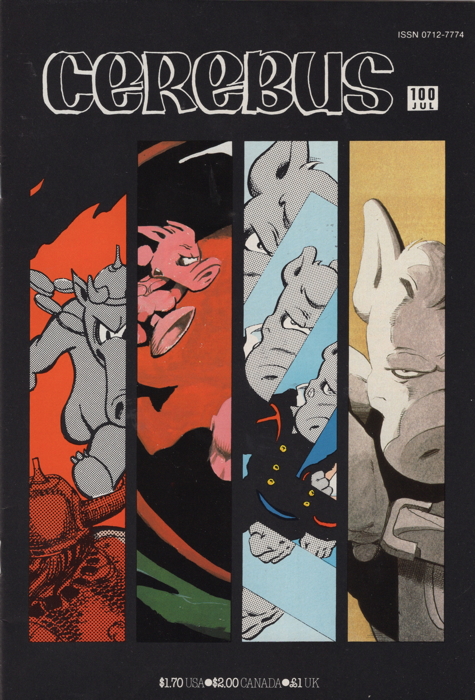Spoilers for Cerebus #100.

I’ve talked about this in various places before, and Tom Ewing even points out it out in one of his essays, but Cerebus reaching issue #100 in mid-1987 was a special event. Even the cover, pictured above, looked out of place from the Cerebus covers before or since, reprinting segments of covers of previous issues (specifically #1, #25, #50, and #75) relegated what would have been the standard cover, reflecting the actual contents, to the back.
Let me give you a little lead-up here. (And just to remind you, the title of this post will indeed spoil something major, so if you haven’t read Cerebus and in the statistically-unlikely event you plan to do so, you might want to skip to after the “• • •” bit.)
The series began as a parody of Conan the Barbarian (“Conan the Barbarian” –> “Cerebus the Aardvark,” you see), and in particular the Barry Windsor-Smith version of the character from the earliest issues. The conceit that our lead character is a tough sword-wielding aardvark in a world of humans is one of the initial sources of incongruous humor.
And as the series went on, Cerebus…well, continued being an “aardvark,” obviously. A cartoony rendition of one, anthropomorphized, walking around on two legs, kinda sorta looking like a real aardvark if you squint a bit:

a real aardvark, taken from the Wikipedia page and credited to this source
And as you read the comic, you simply accepted that our protagonist was this weird little grey-toned thing and the representation of the idea of an aardvark just became, well, Cerebus. Cerebus was Cerebus, the focus of the willing suspension of disbelief, and once you suspended that belief, there wasn’t much call to reflect on Cerebus’ nature.
I mean, it came up from time to time. Cerebus used his tail to do stuff (and it would notably pop out of his clothing at quite the inopportune moment). I can’t remember if it’s brought up (or simply implied) that Cerebus’ parents were ordinary humans by this point in the series. And eventually a character states “there are three aardvarks,” which is quite the revelation (and puts me in mind of the still technically unresolved “three Jokers” reveal in that Justice League comic, depending on the shaky canonicity of DC’s Black Label line).
To cut to the chase here, Cerebus #100 hits us with a last page shocker that I’d put up against almost any other cliffhanger in comics. I’ll link the image here so it just doesn’t pop up and spoil people trying to skim past all this text, but what we get is…another aardvark. Hey, that fella saying there were three aardvarks is, as of #100, at least two-thirds correct!
And it’s, as I said, a shock. We were so used to Cerebus just being Cerebus that we forgot he was An Aardvark in a World of Men, that he is, not just in the context of being a funny animal parody of Conan, but in the actual fictional context of the world within the comic, he’s well, a freak. With the introduction of this new aardvark character, we no longer can just have Cerebus be Cerebus. Now we have to think about what it means that there are humanoid aardvarks in this world, what is the relationship between the two aardvarks we’re aware of, where is that supposed third aardvark? The “aardvark” part of the story went from a gimmick to get you to pick the comic off the stands to, suddenly, a vital part of the narrative.
This was a masterful bit of storytelling, one that not only opened up the comic to new possibilities, but forced readers to reconsider their own relationship with, and interpretation of, the unfolding saga. I’ve read comics for a very long time, and this particular issue remains one of the high points of my immersion in this art form.
Okay, SPOILERS are over, let’s get to the point of all this. Just a few days ago, inspired by Tom Ewing’s essays, I started chatting about Cerebus on Bluesky. Mostly I talked about how, once creator Dave Sim’s personal beliefs and opinions and very life became part and parcel with the comic’s narrative, the series’ potential as an enduring classic was diminished. As I said there, it’s Dave’s comic, he could do whatever he wanted with it. But what he did with it was largely offputting and…wildly controversial in regards to his particular worldview, that now any discussion of the work as a whole has to address this.
There was someone on Bluesky who kept trying to argue with me and others that it’s the fault of critics who keep bringing up Dave’s views in discussing the comic. That the comic should just be discussed as it is, without bringing Dave into it.
Which, as anyone who’s read the comic or is at least familiar with it knows, is an entirely bonkers idea as it’s not critics or readers who brought Dave’s Views into the comic. It was Dave. As I said on Bluesky:
“Dave’s worldview doesn’t just inform the work. To a major extent it IS the work, and trying to discuss CEREBUS simply as a work of fiction without addressing its creator would be a failure of literary analysis.”
It affects literally everything in the comic, once Dave reveals what he believes. Is the degeneration of Jaka over the course of the series simply supposed to represent this one character’s arc, or is it “see what women are like!” I mean, the thought will cross your mind.
The top bit of this post was me trying to discuss a specific part of Cerebus that stuck with me, ever since I read it…I don’t know, given comic cover dates I was either just wrapping up high school, or I was in the summer before I started college. It impressed the hell out of me, and still does. Many parts of Cerebus still impress me. Even in later issues, after, well, everything, the artwork and even the lettering are still outstanding. But in talking about #100, though trying to avoid anything about what happened later in the series, I see I still put a tiny caveat in.
To be clear, as I was writing it just sort of came out of me as I was shunting words from my brain to my fingers, dashing off an initial draft. I refer to anyone who hasn’t read Cerebus as being “statistically unlikely” to do so at this point. I just went ahead and left it in there, since, without really meaning to, I still made at least some reference to the fact that you’re not going to read it, for the implied reason of, well, you know.
I’ve talked about Cerebus a lot on this site. I think most of the time I bring up, even if only briefly the controversy around this comic. It’s almost reflexive. “Yes, I do love the early parts of Cerebus. Yes, I know how it all ended up.” I still love those early issues. I still love that #100. I’m still in the market trying to complete the first 25 issues of the series that I only previously had in the Swords of Cerebus reprint paperbacks. I still hold up the “High Society” story as one of the absolute heights of sequential art.
But I know there will always be an asterisk on the work. And that the great parts of the series will be overshadowed by the not-so-great bits. And what could have been an eternally-read classic is instead disdained if not outright ignored. It really is too bad.







cerebus, unfortunately for me, came at a time long before i was into comics and continued through my initial forays during CRISIS. I had read a lot about it in Comics Buyer’s Guide, but by the time i could drive to the comics shops and shows, it was so far along that it just didn’t seem possible to deal with.
Just a few years ago, no more than 7, I did borrow the first phone book collection, and, honestly, i cannot tell you what happened in it or even my reactions to events in the books now. literally nothing stands out to my memory. not characters, not events, not dialog. Some might take that as thinking i hated it, but it just didn’t HIT. weirdly i’d remember a lot of it if i hated it. perhaps it was too much a product of it’s time for me, one of those if you weren’t there for it that’s the end. I don’t know. I’ve read a wide variety of comics since 1985-im not a “superheroes are comics and comics are superheroes” person. it just didn’t hit. i honestly don’t know if i’ll even have the desire to try again, since i have far far too many long boxes to re-read.
About 5 or 6 years ago, I was able to get first prints of the entire run for not-a-horrible amount of money. I’d read the series in collected form years before and wanted to go through the whole thing as single issues, including the letters pages/back-matter. So I sat down, and over the course of a few months, proceeded to read each and every issue…EXCEPT I got to around #280 and was like “y’know, I just can’t anymore” and stopped cold turkey, selling the whole batch on eBay for about twice what I paid.
Fun fact: I did have to re-buy #265 before I could sell them, because my girlfriend’s cat threw up on my original copy – I think it’s hilarious that it was that issue, since that’s the one where Sim doubled down on his feelings about women (the cat is a male, btw).
Other than that guy (who I blocked), it was a really fun conversation. He really is an anomaly, so absolutely different in person than he is via any other communication. (Though I suspect I’d be an abomination to him at this point!)
You really can’t separate Cerebus from Sim’s beliefs, but it is also an excellent case study in how an artist might not say the things with a work that they think they are. I haven’t read the series in too long at this point, but I devoured it 20 years ago, when it was all but complete.
saying you should separate Sim from the work is like saying you should separate Robert Crumb or Joe Matt or Harvey Pekar or Roberta Gregory from their work. the integration of the creator into the work is a key component of the work.
as you already said nicely, but I wanted to throw a few others who popped into my head into the mix.
As someone who will probably never read Cerebus, did they ever show the third aardvark?
There was a time when the idea of not continuing to buy Cerebus every month as it came out was unimaginable to me, but I dropped off before the end of Mothers and Daughters. Tried picking it up sporadically in the years after, but it never stuck.
Eventually caught up on what I missed years after the end, which seemed to hit with the impact of a wet tissue instead of being any kind of celebrated event.
Glad to have finished the run but yeah, can’t say I’d recommend the experience as a whole. If you were someone who was there before things went so wrong, buying month to month watching artistic growth and ambition expanding month to month for year upon year–I started midway through Church & State I–finishing the work provides closure to the reader at least, such as it is. But for the most part it’s not great stuff, by any standard. Sim was his and his work’s own worst enemy, indisputably.
(and yes, the third aardvark shows up–Sim makes sure all prophecies are fulfilled, generally in the least satisfying manner imaginable)
For a long time not having read Cerebus was one of my marks of shame as a comics lover. Like aj said, by the time I was old enough to appreciate the series, it seemed hopelessly complex and not welcoming to new readers. Honestly when Dave went full on misogynist it was a bit of a relief knowing that maybe the work wasn’t a quintessential as it seemed. I know that several of the volumes are extremely well regarded and I shouldn’t let the later ones diminish those storylines. But, as you said, I’m afraid it will be impossible to separate my reading experience from what I know of the man and his views.
Book and comics are funny like that. They require so much more investment than an album. Lou Reed, Ray Davies, and Danzig (’77-’83) are absolute musical heroes of mine, and they were/are huge assholes by all accounts. You can listen to an album in 35sih minutes and be done. Whereas sitting down with one of those phonebooks involves so much more commitment and immersion into the authors worldview.
Like Louis Wain’s cat paintings, Cerebus is of interest in charting the creator’s gradual abandonment of reality.
It should be remembered that Sim’s worldview changed and evolved (umm…is that the correct term?) as the series went along. The writer of Church & State was a very different person than the writer of Mothers & Daughters.
I also wanted to address aj (from the first comment) in that I’m unsure if any comic changed so dramatically from its earliest issues (at least a comic with the same creators) as Cerebus. The first volumn I have always found quite boring, being simply a parody of the Sword & Sorcery subgenre. High Society and Church & State are about as far removed as it’s possible to get from the first volumn without writing a completely different comic.
I consider Church & State to be the high point of the series (others would say it was High Society). If you are interested in reading more of Cerebus, I would recommend those three volumns. Of course, the question becomes if you want to bother with a series that you probably won’t be interested in finishing.
I did enjoy Melmoth, but it has very little to do with the rest of the narrative (it’s thematically slightly connected, but it is really a tangential biographical work about the last days of Oscar Wilde). I found that the series becomes a terrible slog through the next few volumns, as Sim’s changing personal beliefs take up more and more of the text. I do have more time for the artistry of the later volumns (starting with Going Home), which is where many readers choose to give up. It’s much more interesting than anything between Flight and Rick’s Story (Jaka’s Story is also not great, but leads in to Melmoth).
I have no problem separating an author’s work from the person, but yes, it’s completely accurate that Cerebus is a work of fiction in which the author begins to inserts his personal beliefs (and more and more, I’d argue, himself) into the text.
I started picking up Cerebus in college, with the Cerebus Bi-Weekly reprints of High Society, and absolutely loved it at the time. I picked up phone books of the first volume, Church & State, and Jaka’s Story, and was buying Melmoth in singles. It was a slog, especially published monthly, but I was hoping the context of the earlier issues that I hadn’t read yet would eventually make its purpose clearer. (It didn’t, particularly.) I continued reading for a while, but dropped the book during Reads, and picked up a phone book or two afterward, which I don’t think I’ve ever read.
But man, High Society through Jaka’s Story knocked my socks off.
I was a fan from the beginning and got my first issue signed by Dave at a Chicago Con. Had the Swords of Cerebus reprints, etc. even got a photo I took at a Capital City Distributors show published by Dave as a back cover. It was a shot of Dave, Colleen Doran, James Owen and Martin Wagner all mugging for my camera.
Always enjoyed his take on celebs like Mick & Keef but as the series progressed it did seem like he dug a hole by promising 300 issues and having to stretch his story to get there. I found the small type impossible to read so kind of flagged on it as it neared the end.
The thing I’ve always liked most about Cerebus is the art. Shoutout to Gerhard for the massive amount of work he put into those backgrounds (almost) every issue.
Sim did a lot of good work around creators’ rights back in the day. And 300 self-published issues is a huge accomplishment. It’s a shame all that gets overshadowed by his sad Light and Void ramblings.
Honestly, one of the worst parts is that he shot himself in the foot. I’m sure the phone books still make him some money, but not as much as they would have if he had reined in his worst impulses and stuck the landing.
Over the years I worked the shop I was at, we only bothered stocking the High Society and Church & State phone books. On the rare occasion someone would ask about the other volumes, I would just tell them those were the only ones they needed. We were happy to order any of the other if you asked, and in the few cases where someone did order other volumes, they all came back and told me I was right.
I had started buying it new off the rack with #52 the start of Church & State. After a handful of issues, I decided I liked it enough to fill in the previous 51 issues and was lucky enough to do that in the early 80’s when it was fairly cheap to do so. I made it through Melmoth up to #150 and then just gave up. It had started slipping farther and farther down in my “must read” pile by then. In hind sight, that seems like a good place to have done so. I still kind of kept tabs on it through the shop and our customers who stuck with it, but by the last few years of the run we had dropped from about 30 people getting it, to just two (and we were only ordering one extra for the rack -that never sold, and then just went to back issue).
I’m always eager to pick up other Dave Sim work just to look at what he’s working on. The Alex Raymond book is Fantastic. Sadly, I find him repugnant as a person and it’s not always easy to keep those two things separate.
I was buying the monthly book when the “male light” & “female void” garbage started and I kept buying the comic for about a year – at first I thought this had to be some kind of work – like Sim was aping an obviously foolish opinion.
Since this was before I’d read about comics on ye olde tyme internet it took a while reading issues of CBG & TCJ to see – no, this is his belief.
My friend Katrina was a huge fan of the book – she would regularly write Sim, and I remember talking to her soon after all of this was going on – the look of crushing disappointment on her face talking about Cerebus in the post “he man women’s haters club” era is unforgettable to me.
Of course I stopped buying the comics & wound up selling all my floppys years ago, but I still own the first 6 phone books. My wife & I talk about getting rid of them every now & again but from what I’ve seen they don’t sell for much on ebay.
I love those early issues, but nope – I would newer ever suggest anyone read them – I mean comic scholars should read whole series for historical context, for the history of self publishing. for the history of misogyny (and maybe mental illness?) in comic books. But I have zero interest in reading the complete series, and I haven’t felt the urge to reread the early issues either.Its a shame.
I figure if I can still enjoy Ted Nugent’s music, I can still enjoy Cerebus. I would kinda like to know what the hell happened after Melmoth, which is the last part I remember really liking.
I think the early parody era is under-rated! I remember enjoying that part.
Dear Blogger: You mentioned Mighty Mousse Comic #73, which I have long sought — where the cats are turned into bowling balls. Eagerly I purchased the issue and it wasn’t there. Are you SURE it was #73? May Terry Toons #73, or maybe #63? Please check and drop me a line. Maybe the issue I bought was incomplete? I would really appreciate any info you can give me. Best,
patrick
Dear Blogger: You mentioned Mighty Mousse Comic #73, which I have long sought — where the cats are turned into bowling balls. Eagerly I purchased the issue and it wasn’t there. Are you SURE it was #73? May Terry Toons #73, or maybe #63? Please check and drop me a line. Maybe the issue I bought was incomplete?
BTW, regarding Mighty Mouse #73, or whatever it is, if you’re willing to part with it, I’ll give you $75.00 for it, via Zelle or Venmo (preferably Zelle, but I can do both)
patrick
Greg Ginn, Axl Rose, Phil Anzelmo, friggin’ Bing Crosby, Diddy and (probably, don’t know if h’s been formally accused of awfulness) Jay Z… I swear, someday 75% of the music industry will be revealed as massive jerks, abusers, or outright predators. Then there’s the movie industry, tv, comics… I can’t always separate the artist from the art, and the more I learn the less enjoyment I can find in entertainment t I used to like.
I read two issues of Cerebus (from “High Society”) when they were 99 cents on Comixology., just to see what the hype was about. They were good, but I decided not to get more knowing what was coming. Tegan O’Neil wrote and excellent essay (or series, haven’t read them in a while) on her blog a number of years ago that I wish I had a link to. I find I like reading about Cerebus and how it changed rather than experiencing it myself. It’s a shame that Sims disappeared into his beliefs the way he did.
Mike, I know Tom links to Tegan’s essays in his “Dance of the Aardvark Catchers” epilogue (and probably other places too). Here it is:
https://whenwillthehurtingstop.blogspot.com/2011/09/how-we-will-read-cerebus-part-i-as-i.html
And Brian, I remember having the same feeling when I first started reading those awful essays: “Is he doing a bit?” Sadly, no. I’m always inclined to believe the best of people whose art I enjoy, so sometimes when they let me down, it takes a while for me to believe it. And then I look back, and realize the signs were there all along.
Patrick F. – You appear to have found an ancient typo on this site: it is in fact Mighty Mouse #74 that has the story “Purrlin the Powerful” (as per here). My apologies for the inconvenience.
Alas, I no longer have this issue for sale…that was 18 years and a previous job ago. The Mighty Mouse stock at my current store is sadly lacking.
I’ve always wondered how Cerebus would have progressed if Sim and Deni Loubert had had a happy marriage.
Daniel T — Not wishing to psychoanalyze Sim, but I strongly suspect you’re on to something there.
according to this interview excerpt: https://momentofcerebus.blogspot.com/2016/06/deni-loubert-it-was-him-me-against-world.html – the marriage was a solid one up to some drug use apparently triggering some mental health difficulties.
at that link, Dave, of course, responds differently. I always respected what Deni did at both A-V and Renegade.
“Greg Ginn”
Didn’t know there’d been accusations against him.
“I’ve always wondered how Cerebus would have progressed if Sim and Deni Loubert had had a happy marriage.”
Now, THERE’S a good “What If…?” story!
“Mighty Mouse”
“HERE I COME TO SAVE THE DAYYYYYYYYYYYYYYYYYYYYYY!!!”
Forever, Andy Kaufman’s best comedy bit.